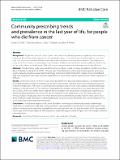Community prescribing trends and prevalence in the last year of life, for people who die from cancer
Abstract
Background People who die from cancer (‘cancer decedents’) may latterly experience unpleasant and distressing symptoms. Prescribing medication for pain and symptom control is essential for good-quality palliative care; however, such provision is variable, difficult to quantify and poorly characterised in current literature. This study aims to characterise trends in prescribing analgesia, non-analgesic palliative care medication and non-palliative medications, to cancer decedents, in their last year of life, and to assess any associations with demographic or clinical factors. Methods This descriptive study, analysed all 181,247 prescriptions issued to a study population of 2443 cancer decedents in Tayside, Scotland (2013–2015), in the last year of life, linking prescribing data to demographic, and cancer registry datasets using the unique patient-identifying Community Health Index (CHI) number. Anonymised linked data were analysed in Safe Haven using chi-squared test for trend, binary logistic regression and Poisson regression in SPSSv25. Results In their last year of life, three in four cancer decedents were prescribed strong opioids. Two-thirds of those prescribed opioids were also prescribed laxatives and/or anti-emetics. Only four in ten cancer decedents were prescribed all medications in the ‘Just in Case’ medication categories and only one in ten was prescribed breakthrough analgesia in the last year of life. The number of prescriptions for analgesia and palliative care drugs increased in the last 12 weeks of life. The number of prescriptions for non-palliative care medications, including anti-hypertensives, statins and bone protection, decreased over the last year, but was still substantial. Cancer decedents who were female, younger, or had lung cancer were more likely to be prescribed strong opioids; however, male cancer decedents had higher odds of being prescribed breakthrough analgesia. Cancer decedents who had late diagnoses had lower odds of being prescribed strong opioids. Conclusions A substantial proportion of cancer decedents were not prescribed strong opioids, breakthrough medication, or medication to alleviate common palliative care symptoms (including ‘Just in Case’ medication). Many patients continued to be prescribed non-palliative care medications in their last days and weeks of life. Age, gender, cancer type and timing of diagnosis affected patients’ odds of being prescribed analgesic and non-analgesic palliative care medication.
Citation
Mills , S , Buchanan , D , Donnan , P T & Smith , B H 2022 , ' Community prescribing trends and prevalence in the last year of life, for people who die from cancer ' , BMC Palliative Care , vol. 21 , 120 . https://doi.org/10.1186/s12904-022-00996-3
Publication
BMC Palliative Care
Status
Peer reviewed
ISSN
1472-684XType
Journal article
Description
Funding: SM is funded through a Clinical Academic Fellowship (CAF_17_06) from the Chief Scientist Office. PATCH Scotland and Tayside Oncology Research Foundation Research Grants funded data extraction and storage costs. Publication costs were funded by the University of St Andrews.Collections
Items in the St Andrews Research Repository are protected by copyright, with all rights reserved, unless otherwise indicated.

